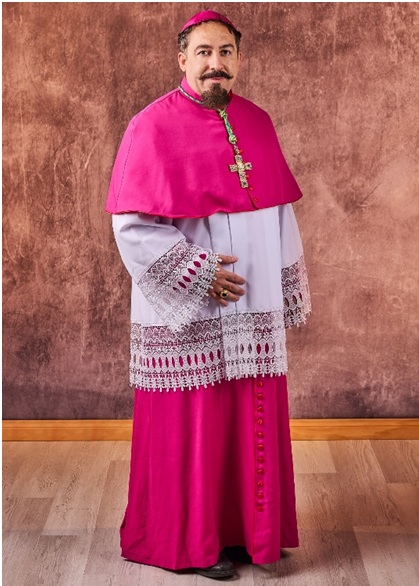
In an informal interview with newly elected and consecrated bishop Dr. Edik Baroni, who holds a doctorate in Theology pastoral ministry, we wanted to know what can a nonreligious person learn from a bishop; since a bishop has not only religious authority but, in some cases also a civil and legal.
Bishop Edik Baroni informs us that by ordination to the episcopacy, bishops receive the fullness of the Sacrament of Holy Orders and become successors of the Apostles. Through this Sacrament, a bishop belongs to the college of bishops and serves as the visible head or pastor of the local Church entrusted to his care. As a college, the bishops have care and concern for the apostolic mission of all the churches in union with the authority of the head of the college of bishops which can be the Pope of Rome, a specific Patriarch or Catholicos, or the Presiding bishop of a particular church.
Dr. Baroni adds that there are things that people should know about bishops as they are not acknowledged by many. To name a few, a bishop loves every member of his Church, from faithful to clergies. A bishop is physically, emotionally, and spiritually sustained by the faith and prayers of the members. Sometimes a bishop feels incredibly inadequate for the calling (even after a few years), but the Spirit of God works through the bishop when administrating sacraments to his flock.
There are so many things that one can learn from a bishop that are not religious matters but more professional; some of these basic skills are piled up below in four categories:
Communicate
- Speak clearly so listeners can understand.
- Listen to others and ask questions.
- Understand written information.
- Read and understand work-related materials.
- Understand spoken information.
- Write clearly so other people can understand.
Reason and Problem Solve
- Notice when something is wrong or is likely to go wrong.
- Judge the costs and benefits of possible action.
- Use reasoning to discover answers to problems.
- Understand new information or materials by studying and working with them.
- Think of new ideas about a topic.
- Combine several pieces of information and conclude.
- Follow guidelines to arrange objects or actions in a particular order.
- Think of original, unusual, or creative ways to solve problems.
- Analyze ideas and use logic to determine their strengths and weaknesses.
- Recognize the nature of a problem.
- Remember information such as words, numbers, pictures, and procedures.
- Develop rules that group items in various ways.
- Identify what must be changed to reach goals.
- Concentrate and not be distracted while performing a task.
- Recognize when essential changes happen or are likely to occur in a system.
Manage Oneself, People, Time, and Things
- Manage the time of self and others.
- Check how well one is learning or doing something.
- Motivate, develop, and direct people as they work.
- Obtain needed equipment, facilities, and materials and oversee their use.
- Go back and forth between two or more activities or sources of information without becoming confused.
Work with People
- Look for ways to help people.
- Be aware of others’ reactions and understand the possible causes.
- Teach others how to do something.
- Solve problems by bringing others together to discuss differences.
- Persuade others to approach things differently.
- Use several methods to learn or teach new things.
- Change behavior concerning others’ actions.
In the end, Bishop Edik Baroni says all these skills require discipline, which can be obtained from religious and academic education. He tells us all these skills will not come overnight and become part of an individual personality and habits but requires lots of effort. He brings an example of his language skills. He tells us that many years of study, dedication, and motivation helped him learn to speak and preach in 6 languages such as Armenian, Farsi, English, Italian, Spanish, and French. He also mentioned that his secular job as assistant Vice president of Bank of America since 2010 helped him to achieve a complementary asset towards his religious education. All this means that everything can be achieved with motivation, dedication, effort, and practice.

